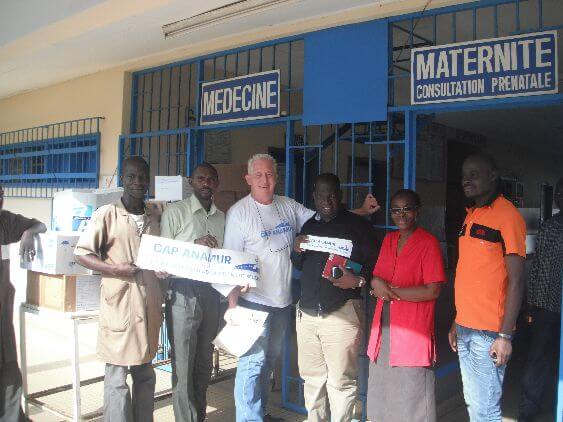Emergency Medical Aid in the Ivory Coast
The situation in most medical facilities in the metropolis of Abidjan in Côte d'Ivoire is very poor. According to the WHO, about 80 percent of medical personnel currently do not show up for work. The state pharmacy PSP can only supply about 30 percent of the drugs needed.
Cap Anamur supports three hospitals in Abidjan
Cap Anamur is currently supporting three hospitals in Abidjan with medicine, medical supplies and personnel. The two facilities in Gonzague Ville and Marcory are highly frequented, not least because many refugees from Yopougon are staying there. Thanks to our deliveries of medicines and materials, however, the supply can take place relatively smoothly.
The situation in Yopougon is far more tense. There is a war going on here. And this is where the third hospital supported by Cap Anamur is located. Out of fear, many people do not leave their homes. Most of the medical staff also does not venture into the clinic, so that only one team works in minimal staffing: a midwife, two doctors and a nurse. Since residents learned that medical care was available here, patient numbers have increased tremendously. Last Friday alone, more than 150 patients came. At the moment, this hospital is one of the few that has sufficient medication at all. Our supplies are still sufficient and another aid delivery is already on its way.

The supply and security situation in Abidjan is tense
But it is not only a lack of personnel that makes the work more difficult. Gasoline and diesel are still in short supply. The power supply and telephone and Internet connection do not work constantly. Volker Rath also reports of fighting last Friday in the immediate vicinity of the hospital: “The patients and staff had to flee through the back exit. First, combat helicopters circled over the building, and a short time later government troops opened fire against militias entrenched there. The patients and staff were unharmed, but the fear of renewed fighting remains. One can literally feel the danger, it is not safe. There are checkpoints everywhere and the soldiers are nervous. Every 500 meters you are stopped: Who are you, why are you here, where are you going? Last week there were several more dead. Some are still lying in the streets. The militias are suspected everywhere. Everything is destroyed, the streets are almost deserted. The state of emergency makes our work all the more important.”

An end to the unrest is not yet in sight
It is impossible to say how long the unrest will continue. After weeks of bloody clashes between Gbagbo’s supporters and those of Ouattara, Gbagbo was arrested on April 11. According to the UN, nearly a thousand people were killed in the fighting. The new government under Ouattara launched investigations against Gbagbo and his confidants. Whether the trial can begin this week as planned remains to be seen, as there have also been exchanges of gunfire between supporters of Gbagbo and Ouattara in Abidjan near the seat of government, in the west of the city.

